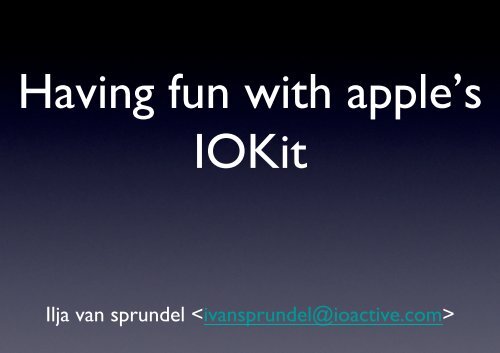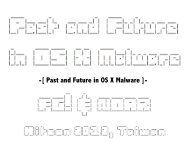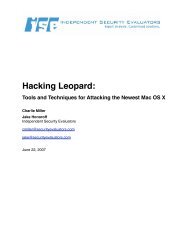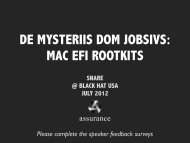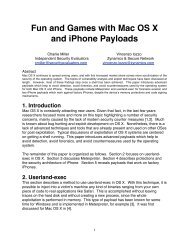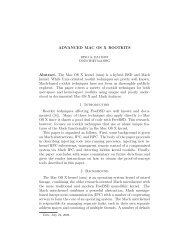Having Fun with Apples IOKit
Having Fun with Apples IOKit
Having Fun with Apples IOKit
You also want an ePaper? Increase the reach of your titles
YUMPU automatically turns print PDFs into web optimized ePapers that Google loves.
<strong>Having</strong> fun <strong>with</strong> apple’s<br />
<strong>IOKit</strong> <br />
Ilja van sprundel
who am I <br />
• Ilja van sprundel <br />
• IOActive<br />
• netric<br />
• blogs.23.nu/ilja
• Introduction <br />
• what is the <strong>IOKit</strong> <br />
• why <br />
• UserClients <br />
• entry points<br />
• marshaling data<br />
• api’s usage <br />
• potential for abuse <br />
• conclusion <br />
• Q&A <br />
Agenda
Introduction <br />
• Preliminary research<br />
• <strong>IOKit</strong> is in kernel code for drivers<br />
• a lot of it ends up being auto generated<br />
code <br />
• because of this it’s virtually unauditted<br />
• a new playground :)
what is the <strong>IOKit</strong> <br />
• kernel framework<br />
• most drivers for OSX use them<br />
• preferred over others (nkext’s, BSD) <br />
• offers wide range of api’s to do things in<br />
drivers
what is the <strong>IOKit</strong> <br />
• C++ code (well, a subset really) <br />
• no exceptions, templates, multiple<br />
inheritance <br />
• it’s ment to look like something userland<br />
dev’s are willing to touch<br />
• has a well defined interface for interaction<br />
<strong>with</strong> userland (passing data back and forth,<br />
usually for configuration) <br />
• functionally not unlike NT’s IOMgr
why <br />
• Why look at the <strong>IOKit</strong> <br />
• juicy target<br />
• very little coverage
UserClients <br />
• Almost all communication <strong>with</strong> the <strong>IOKit</strong> is<br />
done through UserClients <br />
• A C++ class<br />
• All drivers that have UserClients Inherit<br />
from IOUserClient, to make their own<br />
userclients<br />
• abstracted away the real communication
UserClients
UserClients <br />
• 3 ways of inputting data really<br />
• old UserClient (synchronous) <br />
• New UserClient (10.5.x and above)<br />
(asynchronous) <br />
• add an <strong>IOKit</strong> systemcall
Entry points: Mach <br />
• In kernel mach server <br />
• need to send a mach message<br />
• port’s receiver has to be kernel space<br />
• when this is true ipc_kobject_server() is<br />
called
Entry points: Mach <br />
• Here’s where things get a little wobbly <br />
• most of this stuff is Autogenerated MIG<br />
(mach interface generator) code! <br />
• unless you compile the code you won’t see<br />
it <br />
• ~20 in kernel rpc services
Entry points: <strong>IOKit</strong> <br />
• The mach message header id has to match the<br />
<strong>IOKit</strong> one.<br />
• once this is done, all input is passed on to the<br />
<strong>IOKit</strong> subsystem () <br />
• iokit_server_routine <br />
• specific <strong>IOKit</strong> functions have numbers (there’s 71<br />
of them, all auto generated!) <br />
• these are also encoded in the message header id
Entry points: <strong>IOKit</strong> <br />
• 71 functions allow the buildup of a<br />
protocol <br />
• which driver to talk to<br />
• info about the driver<br />
• how to marshal data <br />
• mapping in data<br />
• ...
Entry points: <strong>IOKit</strong><br />
syscalls <br />
• <strong>IOKit</strong> syscalls can also export systemcalls<br />
• iokit_user_client_trap()
Entry points: <strong>IOKit</strong><br />
syscalls <br />
• user has to have an open userclient<br />
connection <br />
• specifies the syscall he wants by number <br />
• allows for up to 6 arguments <br />
• arguments are passed directly to syscall <br />
• no validation done, it could be anything
Marshaling data <br />
• passing data to <strong>IOKit</strong> UserClient methods <br />
• index number for the method <br />
• input and output<br />
• 2 types of data <br />
• scalar<br />
• structure
Marshaling data <br />
• gives 4 combinations in total<br />
• input scalar, output scalar<br />
• input scalar, output struct <br />
• input struct, output scalar <br />
• input struct, output struct
Marshaling data <br />
• once everything is put in the right structurs <br />
• the marshaling code calls the<br />
externalMethod() method on the<br />
UserClient <br />
• this one will call it’s actual UserClient<br />
Method, based on the index
Marshaling data <br />
• Here’s how it looks:
Marshaling data <br />
• mapping index numbers to methods and<br />
syscalls <br />
• UserClient’s are supposed to implement 2<br />
functions to do the mapping: <br />
• getExternalMethodForIndex(uint idx); <br />
• getExternalTrapForIndex(unit idx);
Marshaling data <br />
• Method index mapping
Marshaling data <br />
• syscall index mapping
Marshaling data <br />
• index mapping bug: <br />
• off-by-one :)
Api’s <br />
• <strong>IOKit</strong> is a massive framework<br />
• has api’s for almost everything<br />
• most of it is it IOLib.cpp <br />
• will talk about some of them
api’s: memory<br />
allocation <br />
• IOMalloc <br />
• void * IOMalloc(vm_size_t size); <br />
• IOMallocAligned<br />
• void * IOMallocAligned(vm_size_t size, vm_size_t alignment); <br />
• IOMallocContiguous <br />
• void * IOMallocContiguous(vm_size_t size, vm_size_t alignment, IOPhysicalAddress * physicalAddress)!
Api’s: Memory<br />
allocation
Api’s: Memory<br />
allocation
Api’s: Memory<br />
descriptors <br />
• When marshaling data, memory<br />
descriptors are used<br />
• allows both user and kernel to share data<br />
• not unlike NT’s MDL’s (Memory descriptor<br />
lists)
Api’s: Memory<br />
descriptors
types of bugs <br />
• The usual applies<br />
• int overflows <br />
• buffer overflows <br />
• ...
types of bugs <br />
• Race conditions due to memory<br />
descriptors being used
types of bugs<br />
• format string bugs <br />
• <strong>IOKit</strong> code is really ment to be more open<br />
towards dev’s who don’t really do lowlevel<br />
kernel stuff<br />
• offers a mutlitude of api’s <br />
• including format functions
types of bugs <br />
• IOLog() is a great example<br />
• google (codesearch) dork:<br />
• IOLog\([^”]*\) lang:c++
fmt bug examples
fmt bug examples
fmt bug examples
potential for abuse <br />
• summary: <br />
• indexes for methods need to be validated by driver (in<br />
getExternalMethodForIndex()) <br />
• indexes for methods need to be validated by driver (in ExternalMethod()) <br />
• indexes for systemcalls need to be validated by driver (in<br />
getExternalTrapForIndex()) <br />
• arguments to syscalls not validated in any way <br />
• driver should watch out <strong>with</strong> format functions in IOLib (IOLog, printf,<br />
OSKextLog, ...) <br />
• IOLib’s malloc wrappers need some work<br />
• Race conditions <strong>with</strong> shared memory
Conclusion <br />
• <strong>IOKit</strong> is an interesting<br />
• relatively new (compared to IOMgr, unix<br />
ioctl’s, ...) <br />
• Has had very little scrutiny so far, lots of<br />
potential for bugs in framework itself <br />
• not quite sure of the c++ thing -imo kernel<br />
code should be plain c- lots of potential for<br />
driver bugs <br />
• The entrypoints are virtually un-auditted,
Conclusion <br />
• some positive notes<br />
• mach copies all userdata to kernel, so<br />
generally no user pointers passed to <strong>IOKit</strong><br />
(capture) <br />
• ofcourse there might be embedded<br />
pointers in the driver specific code
food for though/todo <br />
• fuzzing (working on it, took more time<br />
then I figured I needed) <br />
• <strong>IOKit</strong> 71 callbacks <br />
• this code looks really really naive <br />
• looks like it’ll have lots of bugs<br />
• design bugs
Questions


